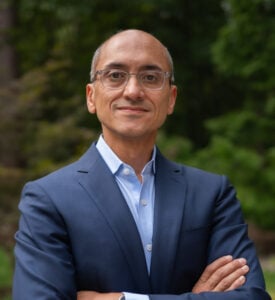Post Author: Yousuf Zafar, MD

Yousuf Zafar is a nationally recognized oncologist, health care executive, and population health researcher with more than 20 years of experience in cancer care, informatics, and value-based delivery. He is a practicing oncologist and adjunct professor at Duke University and chief medical officer at AccessHope, where he focuses on expanding access to expert cancer care knowledge for patients treated in the community. Dr. Zafar is helping to facilitate knowledge-sharing within the oncology community by partnering with National Cancer Institute-Designated Comprehensive Cancer Centers to remotely deliver the latest cancer knowledge to the people and places who need it most: bridging a critical gap for those who do not have access to specialized centers.
Previously, he was senior vice president of medical informatics at Optum and Change Healthcare and held leadership roles at Duke Cancer Institute, where he led development of an AI-driven cancer risk model that reduced readmissions by 50 percent and doubled appropriate hospice referrals.
Dr. Zafar has authored over 100 peer-reviewed publications, which are available on ResearchGate, and has led research funded by the National Institutes of Health and the American Cancer Society. His expertise spans clinical trials, real-world evidence, precision medicine, and health equity.
He is a fellow of the American Society of Clinical Oncology and serves on advisory boards including Health Evolution, the Personalized Medicine Coalition, and WCG IRB. In addition, he is a board member of Family Reach, a nonprofit helping families manage the financial burdens of cancer care. Dr. Zafar also shares professional insights and updates on LinkedIn and X @yzafar.

Yousuf Zafar is a nationally recognized oncologist, health care executive, and population health researcher with more than 20 years of experience in cancer care, informatics, and value-based delivery. He is a practicing oncologist and adjunct professor at Duke University and chief medical officer at AccessHope, where he focuses on expanding access to expert cancer care knowledge for patients treated in the community. Dr. Zafar is helping to facilitate knowledge-sharing within the oncology community by partnering with National Cancer Institute-Designated Comprehensive Cancer Centers to remotely deliver the latest cancer knowledge to the people and places who need it most: bridging a critical gap for those who do not have access to specialized centers.
Previously, he was senior vice president of medical informatics at Optum and Change Healthcare and held leadership roles at Duke Cancer Institute, where he led development of an AI-driven cancer risk model that reduced readmissions by 50 percent and doubled appropriate hospice referrals.
Dr. Zafar has authored over 100 peer-reviewed publications, which are available on ResearchGate, and has led research funded by the National Institutes of Health and the American Cancer Society. His expertise spans clinical trials, real-world evidence, precision medicine, and health equity.
He is a fellow of the American Society of Clinical Oncology and serves on advisory boards including Health Evolution, the Personalized Medicine Coalition, and WCG IRB. In addition, he is a board member of Family Reach, a nonprofit helping families manage the financial burdens of cancer care. Dr. Zafar also shares professional insights and updates on LinkedIn and X @yzafar.
Where a person lives far too often determines the quality of cancer care they receive and, ultimately, their chances of survival. Despite decades of progress in precision oncology, stark disparities persist between patients treated in urban academic centers and those in rural or underserved communities. A JAMA Network Open study of nearly 37,000 patients found that when rural and urban patients receive the same, protocol-driven care, their outcomes …
Read more…
Cancer care has long been associated with physical, emotional, and psychological hardship. But for many patients, a quieter burden (the financial strain of treatment) shapes their experience in equally profound ways. Increasingly referred to as financial toxicity, this form of distress is emerging as a key determinant of cancer outcomes. Yet it remains under-recognized in day-to-day clinical care.
The high price of staying alive
Financial toxicity describes the economic hardship caused by …
Read more…
In the past 50 years, cancer in many cases has morphed from a certain death sentence into a chronic illness. However, cancer is unlike other chronic conditions. There are hundreds of different cancers, classified by where they start in the body and how their cells behave. To turn cancer from an acute, life-ending illness into a chronic one, we now understand that cancer must be treated with a targeted, personalized …
Read more…
Everyone is talking about health care costs these days. The presentations usually start with a chart of rising health care expenditures, the tip of the line pointing skywards. Next come exhaustive (and exhausting) tables, more charts, all punctuated with a final shrug of uncertainty from the speaker: What is the solution to rising costs? Of course, there is not just one.
But in the morass of data, we can lose the …
Read more…









![AI censorship threatens the lifeline of caregiver support [PODCAST]](https://kevinmd.com/wp-content/uploads/Design-2-190x100.jpg)
